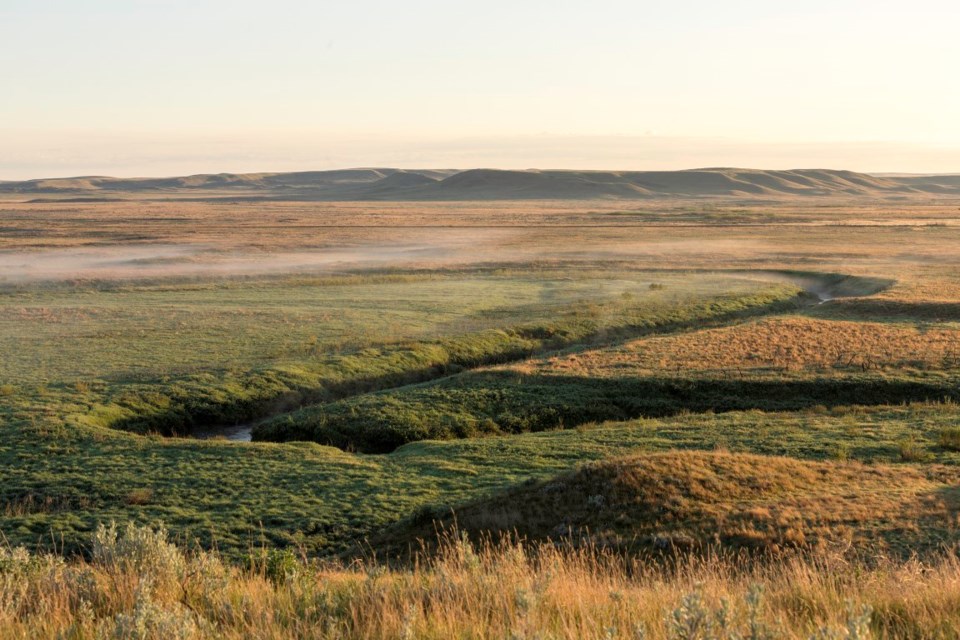EASTEND – A new producer-centered project, based in Saskatchewan, will join a national network of living labs aimed at sequestering carbon and reducing greenhouse gas emissions from farmland.
The Â鶹ÊÓƵ of the Divide Conservation Action Program, Inc. (SODCAP) is launching a major initiative to identify agricultural practices to mitigate climate change, with $8 million in support from Agriculture and Agri-Food Canada (AAFC) over the next five years. The new living lab will investigate how prairie soils, plants, and animals interact to influence carbon cycling and storage, nutrient use efficiency, farm profitability, conservation outcomes and more.
The project is focused on producers’ interests and needs, with approximately 25 farm and ranch operations currently slated to participate. Producers will avoid converting native and naturalized lands to other uses, implement innovative grazing management practices, plant perennial species in new and existing stands and seed diverse annual cover crops to be grazed by livestock. Researchers from AAFC, Environment and Climate Change Canada, the University of Saskatchewan, University of Alberta, University of Waterloo, Carleton University, Bird Studies Canada, Canadian Wildlife Federation and the Royal Saskatchewan Museum will work with producers to quantify system-wide effects of implementing these practices.
The living labs model of innovation uses an iterative, collaborative process to develop, test and implement beneficial management practices (BMPs). Industry stakeholders will be important participants, providing feedback on the types of practices to be investigated, and the information producers will require to consider adopting BMPs. Organizations involved in project development and delivery include the Beef Cattle Research Council, Canadian Cattle Association, Canadian Roundtable for Sustainable Beef, Ducks Unlimited Canada, Saskatchewan Association of Watersheds, Saskatchewan Bison Association, Saskatchewan Cattlemen’s Association, Saskatchewan Forage Council, Saskatchewan Prairie Conservation Action Plan, Saskatchewan Stock Growers Association, Saskatchewan Stock Growers Foundation, Alberta Beef Producers, Alberta Conservation Association and Nekaneet First Nation.
SODCAP and its partners are motivated to help Prairie agricultural systems remain productive and resilient in the face of climate change, according to a press release. This not only requires an understanding of soil carbon storage and greenhouse gas dynamics, but also the impacts of BMP implementation on other ecological goods and services from farmland, SODCAP leaders say.
According to board co-chair Keith Day, “The living lab is a great opportunity to understand benefits of farm and ranch management that stretch far beyond the farm gate. As an organization, we are especially interested in understanding the value of carbon held in native grasslands, and how soil carbon storage is related to other landscape values, including wildlife conservation. Ultimately, we want to support producers in navigating opportunities related to the ecosystem services they provide on their farms and ranches, while ensuring that policymakers are working with data that reflects the reality on the ground.”
Board co-chair Lorne Scott adds, “Conserving grassland ecosystems is one of Canada’s best opportunities to fight climate change. Native prairie landscapes store massive pools of carbon, but are at risk of being converted to other uses. Landowners should be recognized for management practices that keep ecosystems intact and healthy over the long term.”
Funding for the project comes from AAFC’s program. The Minster of Agriculture and Agri-Food, Marie Claude Bibeau noted in their about the new Living Labs projects: “For generations, Canadian farmers and researchers have been finding new ways to protect natural resources while making production practices more efficient. By working together, they are creating innovative research-based solutions that can be applied to real-world challenges on the farm. Our efforts are accelerating the sector’s ability to respond to climate change, all while working to ensure global food security.”
The living lab builds on SODCAP’s success working with agricultural producers across southern Saskatchewan to achieve conservation goals on working landscapes, the press release states. The project also sees SODCAP expanding its geographic scope, with project sites distributed throughout Saskatchewan’s brown, dark brown and black soil zones, plus some complementary sites in Alberta.
The core team overseeing the project include Project General Manager Kelly Williamson, Science Lead Dr. Michael Schellenberg, Engagement and Knowledge Transfer Lead Tom Harrison and Project Co-ordinator Adrienne Tastad. The AAFC component of the project is co-led by Drs. Fardausi (Shathi) Akhter and Aklilu Alemu, and co-ordinated by Kim Hodge.




